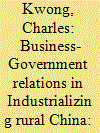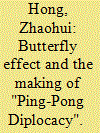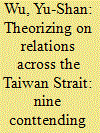|
|
|
Sort Order |
|
|
|
Items / Page
|
|
|
|
|
|
|
| Srl | Item |
| 1 |
ID:
018239


|
|
|
|
|
| Publication |
Nov 2000.
|
| Description |
489-512
|
| Summary/Abstract |
In the wake of repeated crackdowns on the 'three disorders' and 'small treasuries', it is obvious that local governments in China collect substantial amounts of illegal monies. What is not immediately obvious is how illegal monies matter. In this article, I assess both the amount of illegal monies that local governments collect and their significance relative to local autonomy. I find that because illegal monies are not rival to legal monies but rather complementary, although illegal monies may give local governments a greater ability to pursue their own particularistic agendas, they do not fundamentally alter the principalagent structures that link the localities to the center.
|
|
|
|
|
|
|
|
|
|
|
|
|
|
|
|
| 2 |
ID:
018240


|
|
|
|
|
| Publication |
Nov 2000.
|
| Description |
513-534
|
| Summary/Abstract |
This paper explains why rural enterprises prosper in the post-Mao reform era. Based on a case study of Shaanxi province, the paper argues that the institutional arrangements in rural China under economic reforms are conducive to sustained economic growth because the principal–agent problem is alleviated in two dimensions. First, the interests of local government officials and enterprises overlap. Prompted by the fiscal pressures on local governments as a result of the fiscal reforms, particularly the 1994 tax-assignment reform, local governments are eager to promote local industrial growth. Apart from absorbing rural surplus labour and contributing to the provision of communal welfare to local residents, rural enterprises provide local governments with tax and non-tax revenues to finance their expenditure obligations. In return, local governments provide preferential aid to their enterprises in the form of tax and credit privileges. Second, the principal–agent problem is abated by a closer effort-and-reward link for the various parties involved in the operation of rural enterprises.
|
|
|
|
|
|
|
|
|
|
|
|
|
|
|
|
| 3 |
ID:
018237


|
|
|
|
|
| Publication |
Nov 2000.
|
| Description |
429-448
|
| Summary/Abstract |
With the aid of the 'butterfly effect' theory, this article investigates the role of ordinary individuals, both Chinese and American, in the formulation, implementation and promotion of 'Ping Pong Diplomacy', which brought about the US–China rapprochement in the early 1970s. Through examining the twists and turns in the process of 'Ping Pong Diplomacy' making, this study intends to bring one's attention to a number of seemingly less significant historical episodes and their long-term impact on US–China relations. Like small butterflies whose spontaneous actions can generate unexpected climatic changes, the various individuals in this study, including players and officials of the table-tennis teams, low-ranking diplomats and journalists, played an indispensable part in bringing forth a dramatic transformation in US–China relations, which in turn altered the Cold War climate in general.
|
|
|
|
|
|
|
|
|
|
|
|
|
|
|
|
| 4 |
ID:
018238


|
|
|
|
|
| Publication |
Nov 2000.
|
| Description |
467-488
|
| Summary/Abstract |
This study attempts to reveal the political dynamics of economic reforms in China through an analysis of the case of Beijing. As anywhere else in China, Beijing experienced rapid economic growth from 1978 through to 1994. During this period, Beijing's GDP increased four times; Beijing's foreign investment amounted to $26.1 billion and the number of foreign enterprises reached 10,196; and Beijing's people increased their income by a factor of 10. In the meantime, however, as in other places in China, Beijing witnessed more rampant corruption than ever in the history of the People's Republic. The world was shocked in 1995 by the news that a senior vice mayor of Beijing committed suicide and that the party secretary—a politburo member—was first placed under house arrest and then faced criminal charges because of corruption. The attack on Beijing by the center revealed another dynamic in the particular case of Beijing, that is, a strong capital can hardly coexist with the center. The strong capital may defy the power of the center, but the center has to control the capital to command the whole country. The struggle between the center and the capital resulted in the defeat of the capital, as was the case in the Cultural Revolution.
|
|
|
|
|
|
|
|
|
|
|
|
|
|
|
|
| 5 |
ID:
018235


|
|
|
|
|
| Publication |
Nov 2000.
|
| Description |
373-406
|
| Summary/Abstract |
China will join the WTO soon. This article does not question the rationale of China's decision to join the WTO; nor does it challenge the premise that, all in all, the potential benefits from WTO membership outweigh the potential costs, at least in the long term. Rather, it focuses on the social and political implications of China's WTO membership. It is assumed that even if WTO membership is potentially a productivity-enhancing move for China, the benefits and costs of such a change will not be evenly distributed. Unless there is a mechanism that can induce or force the winners to compensate the losers, distributive conflicts between the two groups will be inevitable. Such conflicts may weaken or even erode political support for globalization. Thus, to remain committed to globalization, the government of an open economy must play a role in redistributing gains and costs. The first section elaborates this analytical framework. The second section argues that Chinese reforms have changed from a win–win game to a zero-sum game. As a result, China has turned itself from a relatively egalitarian society into one with huge and growing inequalities. The third section analyzes who will stand to win and lose when China joins the WTO. It predicts that precisely those social groups who have borne the costs of recent reforms will be hit hardest. More significantly, those losers happen to be the social groups that have long served as the political bases of the communist regime. WTO membership thus poses a challenge to the legitimacy of the Chinese government. The final section discusses the political implications of China's WTO membership.
|
|
|
|
|
|
|
|
|
|
|
|
|
|
|
|
| 6 |
ID:
018236


|
|
|
|
|
| Publication |
Nov 2000.
|
| Description |
407-428
|
| Summary/Abstract |
Cross-Strait relations between Taiwan and mainland China are of great importance to the development of China and peace in East Asia. However, this subject has not been sufficiently dealt with in a theoretical manner. This paper takes stock of the analytical approaches in the field in an effort to present to the academic world the existing intellectual instruments that interested researchers can take advantage of in cross-Strait studies. Nine approaches are identified. They are: the divided-nation model, integration theory, the power asymmetry model, the vote-maximizing model, the developmental state paradigm, strategic triangle theory, systems theory, political psychology theory, and the cognitive approach. The intellectual roots of these approaches are traced and their applicability to cross-Strait relations examined. Their strengths and weaknesses are also compared. Finally, a synthetic analytical framework is proposed. It is believed that a literature review of this kind is a prerequisite to a theoretical understanding of the cross-Strait relations.
|
|
|
|
|
|
|
|
|
|
|
|
|
|
|
|
|
|
|
|
|